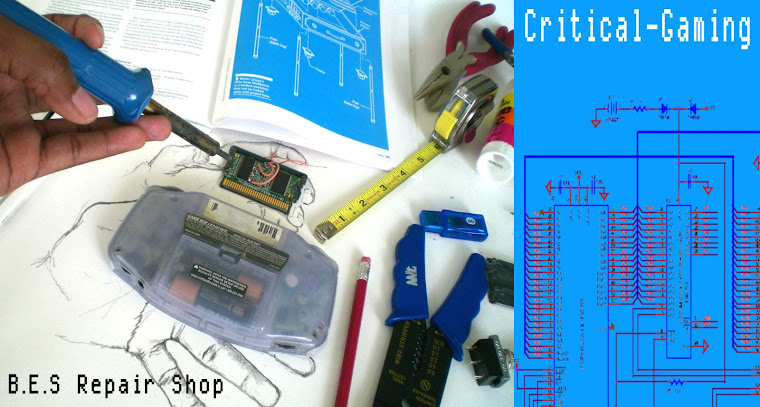What is Drebin?
Drebin is the name of small gaming projects that feature innovative gameplay at the core design. Each innovation is given a number, and each game is made with only enough graphics, sound effects, options, and modes to communicate the core idea. Ideally, each Drebin takes about a week to complete.

What is Drebin #1#2?
As the name suggests, this first Drebin features two gameplay innovations. I'll only talk about #2 today.
Drebin #1#2 is a samurai sword fighting game. Instead of going down the traditional fighting game/action game design route, I wanted to take a more innovative approach. To avoid getting bogged down with different characters, stages, attack moves, and attack animations, I decided to focus on a single encounter between two swordsmen.
Unlike in many movies, TV shows, and games where characters can take hit after hit from guns, blades, punches, kicks, and even explosions and keep on fighting, I wanted to simplify things by making Drebin #1#2 more realistic. After reading Miyamoto Mushashi's classic book of strategy "Book of Five Rings," Japanese sword fighting has given me a new perspective on what it means to fight another person. For Mushashi, the way of the sword was his way of life. And back in the days of Japan when one's skill with a sword was how one stayed alive, the way of the sword was a life or death discipline that had to be taken with the utmost seriousness.
So instead of making different characters, players in Drebin #1#2 are all equal. Instead of creating a stage or level for players to move around in, I reduced the gameplay experience so that there is no running away, and each player can only directly face each other. Instead of making a list of moves for the player to use, I only designed one attack in the game. If any of this sounds familiar to you, it should. Wii Sports and Wii Fit were designed in the same reductive approach to minimize the more redundant, cluttered aspects of the game and focus the player on the single action that is supported by the highly sensitive, accurate, and variable Wiiomte/Wii Balance Board.
The real heart of Drebin #1#2 is the emphasis on physical technique. According to Steve Kaufman, Hanshi 10th Dan, "War is mental and physical." Traditional videogame controllers haven't been addressing the physical side of things. And amateurs that design for the Wii often substitute button presses for some manner of motion control. This baby step in design hardly taps into the Wii's potential. I got around this pitfall by taking what would normally be a single button input for a sword slash, and breaking it down into four separate components.

In order to perform the single attack in the Drebin #1#2, players start by holding the Wiimote in the starting position. The game reads the accelerometer data to determine the angle the Wiimote is being held. The next two inputs are determined by the force from swinging the Wiimote forward and then down. And the last input measures the finishing angle of the Wiimote.
By breaking the attack down into four components, the game can determine the overall speed of execution and if any step in the swing wasn't executed correctly. Perfecting the swing requires practice and training much like a real swordsmen would do. Players have to master themselves in order to master the attack. Unlike grinding in an RPG or practicing combos in a fighting game, drilling the sword strike in Drebin #1#2 has the additional benefit of physical exercise.
I had originally designed the game where players had to step off of the Wii Balance Board with one leg and then strike forward with Wiimote in hand, which would have increased the level of phsical exercise significantly. Unfortunately, the Wii Balance Board was trickier to program for than I had anticipated, and I couldn't get it to work in time. Hopefully in an update to Drebin #1#2 I can include this feature.
By taking the focus of the game away from traditional controller inputs, graphics, characters, and stages, Drebin #1#2 is a game that more reflective of the player. Understanding how to execute the single attack in the game takes minutes to grasp conceptually. But mastering the strike, conquering your nerves, and being able to confidently take out any opponent can take hours of training.
Coming up tomorrow... what is Drebin #1 anyway?


2 comments:
Sounds intense first off and second i really think it is great that you are taking a different approach on the gaming experience like always. having to train the mind but more so the body as well. i always hated playing games like wii tennis when players could just do a super fast flick and get a super fast serve in. it just seems like there is no skill involved. i hope you set it up so that nobody can abuse the system in that they can just perform half the action and get a really good strike of the blade in.
sounds interesting and would love to try it one day.
Thanks Jrhee,
In fact, that's exactly why I added the 3rd step in the strike (the one where you have to pull the wiimote straight down).
I had Marcus test out the system and he could cheap it by doing a mini swing. I think the way I have it now is cheap proof.
It ticked me off as well when my roomates would rapidly flick their wrists around to ensure the tennis ball was hit in Wii Sports Tennis.
Post a Comment